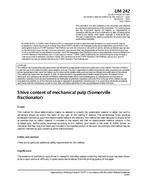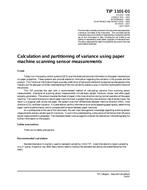Click here to purchase
1.1 This method describes two procedures for testing loaded fiberboard shipping containers by means ofa revolving drum tester.
1.1.1 Procedure A: to determine the ability of the container to withstand rough handling by subjecting itto a variety of shocks and impact stresses simulating those which may be expected in some handling and shipping cycles, and
1.1.2 Procedure B: to determine the relative ability of a package (shipping container and interiorpackaging material, if any) to provide protection to its contents when subjected to a variety of shocks and impact stresses simulating some handling and shipping conditions.
1.2 The procedures described in this method are for a 2.13-m (7-ft) (internal dimensions at intersectionof faces) revolving hexagonal drum and may be used to test containers whose gross weight does not exceed 113 kg (250 lb), and whose maximum dimension does not exceed 510 mm (20 in.). This drum is unsuitable for containers exceeding the above size or for shapes that do not move and fall freely when the drum is rotated.
1.3 Also in use is a 4.27-m (14-ft) diameter drum, described in ASTM D 782. It is rarely used forcontainers whose greatest dimension is less than 510 mm (20 in.). It is used for testing containers whose weight does not exceed 272 kg (600 lb) and whose greatest dimension does not exceed 1020 mm (40 in.).
NOTE 1: The drum test is best suited to obtain the net effect of an unpredictable variety or random combination of shocks and stresses. When the effects of specific types of shocks and stresses are to be determined or isolated, consideration should be given to using another method which provides definite control of the cycle of events, such as the incline impact test TAPPI T 801 7 "Impact Resistance of Fiberboard Shipping Containers" or TAPPI T 802 "Drop Test for Fiberboard Shipping Containers."
Product Details
- Published:
- 04/24/2006
- Number of Pages:
- 5
- File Size:
- 1 file , 69 KB


